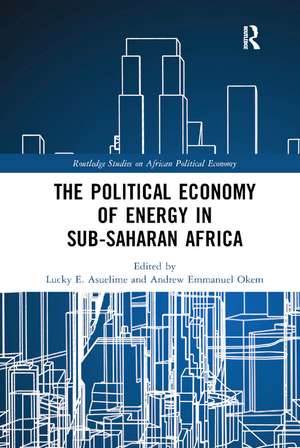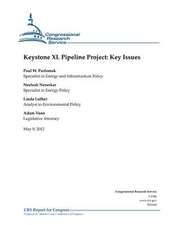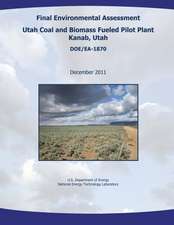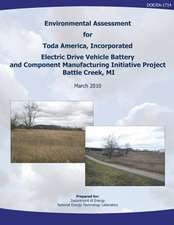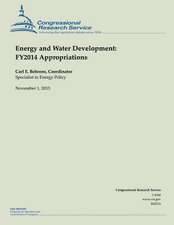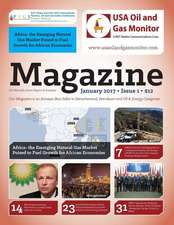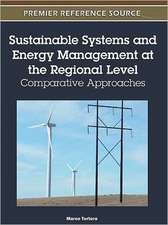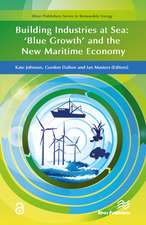The Political Economy of Energy in Sub-Saharan Africa: Routledge Studies on the Political Economy of Africa
Editat de Lucky E. Asuelime, Andrew Emmanuel Okemen Limba Engleză Paperback – 12 dec 2019
Asuelime and Okem bring together a team of specialist contributors who investigate to what extent sub-Saharan Africa has displayed foresight or politico-economic integrity. The book shows that the state’s ability to meet the demands of provision of energy in sub-Saharan Africa has led to heavy investments in infrastructure, transmission and distribution of energy to the citizens. However, the inefficiencies, corruption and unhealthy bureaucratic challenges that accompany this have led to urgent problems, which are thoroughly explored in this book.
The Political Economy of Energy in Sub-Saharan Africa will be of interest to students and scholars of African Studies, Development Studies, political science and environment.
| Toate formatele și edițiile | Preț | Express |
|---|---|---|
| Paperback (1) | 389.66 lei 43-57 zile | |
| Taylor & Francis – 12 dec 2019 | 389.66 lei 43-57 zile | |
| Hardback (1) | 763.39 lei 43-57 zile | |
| Taylor & Francis – 3 oct 2017 | 763.39 lei 43-57 zile |
Din seria Routledge Studies on the Political Economy of Africa
-
 Preț: 311.56 lei
Preț: 311.56 lei -
 Preț: 387.20 lei
Preț: 387.20 lei -
 Preț: 389.66 lei
Preț: 389.66 lei -
 Preț: 384.48 lei
Preț: 384.48 lei -
 Preț: 381.39 lei
Preț: 381.39 lei - 18%
 Preț: 1002.95 lei
Preț: 1002.95 lei -
 Preț: 382.95 lei
Preț: 382.95 lei -
 Preț: 387.75 lei
Preț: 387.75 lei
Preț: 389.66 lei
Nou
Puncte Express: 584
Preț estimativ în valută:
74.56€ • 78.05$ • 62.06£
74.56€ • 78.05$ • 62.06£
Carte tipărită la comandă
Livrare economică 31 martie-14 aprilie
Preluare comenzi: 021 569.72.76
Specificații
ISBN-13: 9780367888527
ISBN-10: 0367888521
Pagini: 200
Dimensiuni: 156 x 234 x 11 mm
Greutate: 0.45 kg
Ediția:1
Editura: Taylor & Francis
Colecția Routledge
Seria Routledge Studies on the Political Economy of Africa
Locul publicării:Oxford, United Kingdom
ISBN-10: 0367888521
Pagini: 200
Dimensiuni: 156 x 234 x 11 mm
Greutate: 0.45 kg
Ediția:1
Editura: Taylor & Francis
Colecția Routledge
Seria Routledge Studies on the Political Economy of Africa
Locul publicării:Oxford, United Kingdom
Public țintă
Postgraduate and UndergraduateCuprins
Part I: Introduction
1. Expanding the Frontiers of the Political Economy of Sub-Sahara Africa’s Energy
Part II: Theories and Concepts
2. Deliberative Theory and the Politics of the Natural Resource Economy in Southern Africa
3. In Pursuit of Pro-Poor Development in Ghana: Is Accessible, Affordable and Reliable Energy Supply the Missing Link
4. Ecological Social Work: Reconnoitering Socio-Cultural and Socio-Political Patterned Ecological Conservation Awareness and Benefits at the Big 5 False Bay Municipality
Part III: Sustainable Energy, Land and Food Security
5. Global Energy Demand and its Implications for Sub-Saharan Africa
6. Governance Institutions for Sustainable Energy Resources Management in Nigeria: Issues, Perspectives and Policy Agenda for Action
7. The Political Economy of Gendered Relationships and the Land Use Interaction between Natural Resources and Human Agency in Zimbabwe
8. Degradation and Climate Change: Implications for sustainable energy supply in Zambia
Part IV: The Political Economy of Oil and Coal in Nigeria
9. Nigerian Coal Industry: Focus on Effects of Under-utilization to the Economy, 1909-2015
10. Exploring the Political Economy of Fuel Subsidy in Nigeria
11. The Impact of Oil Exploration and Exploitation in the Niger Delta, Nigeria
Part V: Conclusion
12. The Political Economy of Oil, Clean Energy and Environmental Transitions in Sub-Saharan Africa: Lessons for the Future
1. Expanding the Frontiers of the Political Economy of Sub-Sahara Africa’s Energy
Part II: Theories and Concepts
2. Deliberative Theory and the Politics of the Natural Resource Economy in Southern Africa
3. In Pursuit of Pro-Poor Development in Ghana: Is Accessible, Affordable and Reliable Energy Supply the Missing Link
4. Ecological Social Work: Reconnoitering Socio-Cultural and Socio-Political Patterned Ecological Conservation Awareness and Benefits at the Big 5 False Bay Municipality
Part III: Sustainable Energy, Land and Food Security
5. Global Energy Demand and its Implications for Sub-Saharan Africa
6. Governance Institutions for Sustainable Energy Resources Management in Nigeria: Issues, Perspectives and Policy Agenda for Action
7. The Political Economy of Gendered Relationships and the Land Use Interaction between Natural Resources and Human Agency in Zimbabwe
8. Degradation and Climate Change: Implications for sustainable energy supply in Zambia
Part IV: The Political Economy of Oil and Coal in Nigeria
9. Nigerian Coal Industry: Focus on Effects of Under-utilization to the Economy, 1909-2015
10. Exploring the Political Economy of Fuel Subsidy in Nigeria
11. The Impact of Oil Exploration and Exploitation in the Niger Delta, Nigeria
Part V: Conclusion
12. The Political Economy of Oil, Clean Energy and Environmental Transitions in Sub-Saharan Africa: Lessons for the Future
Notă biografică
Lucky E. Asuelime, School of Governance, Johannesburg, South Africa.
Okem Andrew Emmanuel, Maurice Webb Race Relation Unit School of Social Sciences, University of KwaZulu-Natal, South Africa.
Okem Andrew Emmanuel, Maurice Webb Race Relation Unit School of Social Sciences, University of KwaZulu-Natal, South Africa.
Descriere
The book shows that the state’s ability to meet the demands of provision of energy in sub-Saharan Africa has led to heavy investments in infrastructure, transmission and distribution of energy to the citizens. However, the inefficiencies, corruption and unhealthy bureaucratic challenges that accompany this have led urgent problems.
